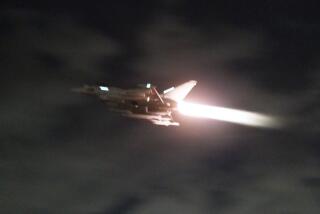Delay Gulf Strike, General Tells Bush : Mideast crisis: Deputy commander says troops will not be ready for combat until February. Officials in Washington express concern about his comments.
- Share via
RIYADH, Saudi Arabia — A senior U.S. military commander here has urged President Bush to delay any military strikes against Iraq until “sometime after the first of February” because troops in the region will not be ready for combat before then.
The deputy commander of all U.S. forces in the Persian Gulf said Wednesday that American military forces will not be in position to go to war on Jan. 15, the deadline the United Nations has set for Iraq to withdraw its troops from Kuwait.
Army Lt. Gen. Calvin A. H. Waller said that some American combat units will not even arrive in Saudi Arabia until the end of January and will require at least two weeks to move into combat positions.
The U.S. expeditionary force in the gulf thus may not be ready for battle until mid-February or even later, Waller said.
The three-star general said that his recommendation to the President and other senior leaders is: “Until our full complement of forces are on the ground, they should not initiate hostile activities.”
Waller also said for the first time that U.S. ground, air and sea personnel in the region will number about 430,000 when the current buildup is completed in late January. Other American officials have studiously avoided putting a specific number on the size of the force in or headed to the region.
Waller, signaling clearly that senior Administration officials do not intend to launch a strike against Iraq on the Jan. 15 U.N. deadline, said he could not “imagine what the President would say that he would want to do right on the 15th.”
But if Bush were to order an attack on Jan. 15, “I’d say no, I’m not ready to do the job,” said Waller, the No. 2-ranking officer in Operation Desert Shield.
The general’s statements indicate that, from a military standpoint at least, the Jan. 15 deadline is largely irrelevant.
In Washington, White House Press Secretary Marlin Fitzwater said: “I think what he (Waller) really said was that they might not be as ready as they would like to be, or ready for all the contingencies they could foresee. But we are assured they will be ready to do whatever they’re called upon to do.”
Another White House official, speaking on condition of anonymity, said Waller’s statement did not “make that much of an impact” in the White House, but he conceded that such frankness was not helpful at this point.
Senior military officials in Washington and Saudi Arabia quickly expressed concern about the “candor” of Waller’s comments. The general’s assertion of unreadiness, they said, might undercut diplomatic efforts to force Iraqi leader Saddam Hussein to comply with the U.N. ultimatum.
Military officials here also said that the general went too far in revealing the size of the deployment and the arrival date of some Army units.
While the United States could launch a massive bombing campaign against Iraq on Jan. 15, military leaders in the theater would recommend against it because they would not have the combat power on the ground to back it up, Waller indicated.
The general’s comments came in a on-the-record briefing for reporters traveling with Defense Secretary Dick Cheney and Gen. Colin L. Powell, chairman of the Joint Chiefs of Staff.
Cheney said a day earlier while en route to the region that the bulk of U.S. forces would be in the theater by Jan. 15 but that there would be “additional work to be done before you would identify them as combat-ready.”
Cheney did not, however, indicate how long that would take, and he did not say that military leaders had cautioned against initiating offensive action before the troops are in place and fully equipped.
Powell on Tuesday had pointedly refused to say whether U.S. forces would be ready for war on Jan. 15 or to speculate on what his advice to Bush would be on that date. He dismissed such questions as “hypothetical.”
But Waller said Wednesday that he could not understand “what is so magic . . . that on Jan. 15 we must be ready to go and initiate hostilities at midnight. . . . “
According to the general, the clock starts ticking on the U.N. demand after that date, not before.
Waller also said that the chief concerns of military commanders in Saudi Arabia now are logistics and manpower issues.
There are “tremendous transport problems” in moving tens of thousands of troops and thousands of tons of material into position for battle, he said.
Waller would not be drawn into a discussion about possible casualties, saying that all such calculations depend on how a war is fought and how long it lasts.
Nor would he speculate on the duration of a conflict with Iraq.
Meanwhile, Reuters news agency reported Wednesday that the United States will send warplanes from four Air Force tactical fighter units based in Europe to the Persian Gulf sooner than previously announced.
The early deployments, beginning today from three bases in Germany and one in Britain, were prompted by operational considerations, said officials at the U.S. Air Force’s European headquarters at Ramstein, Germany.
Times staff writer James Gerstenzang in Washington contributed to this report.
More to Read
Sign up for Essential California
The most important California stories and recommendations in your inbox every morning.
You may occasionally receive promotional content from the Los Angeles Times.












